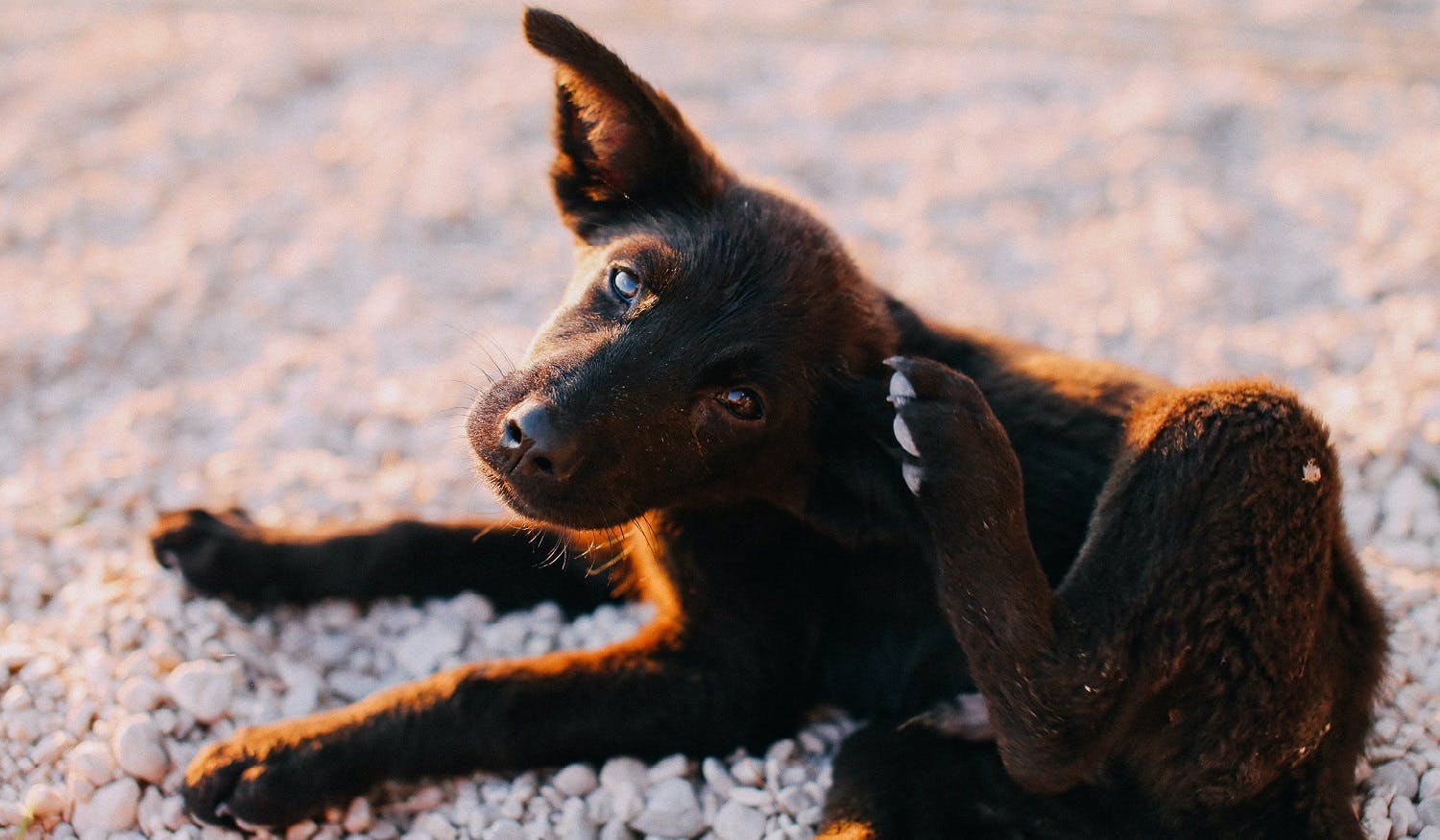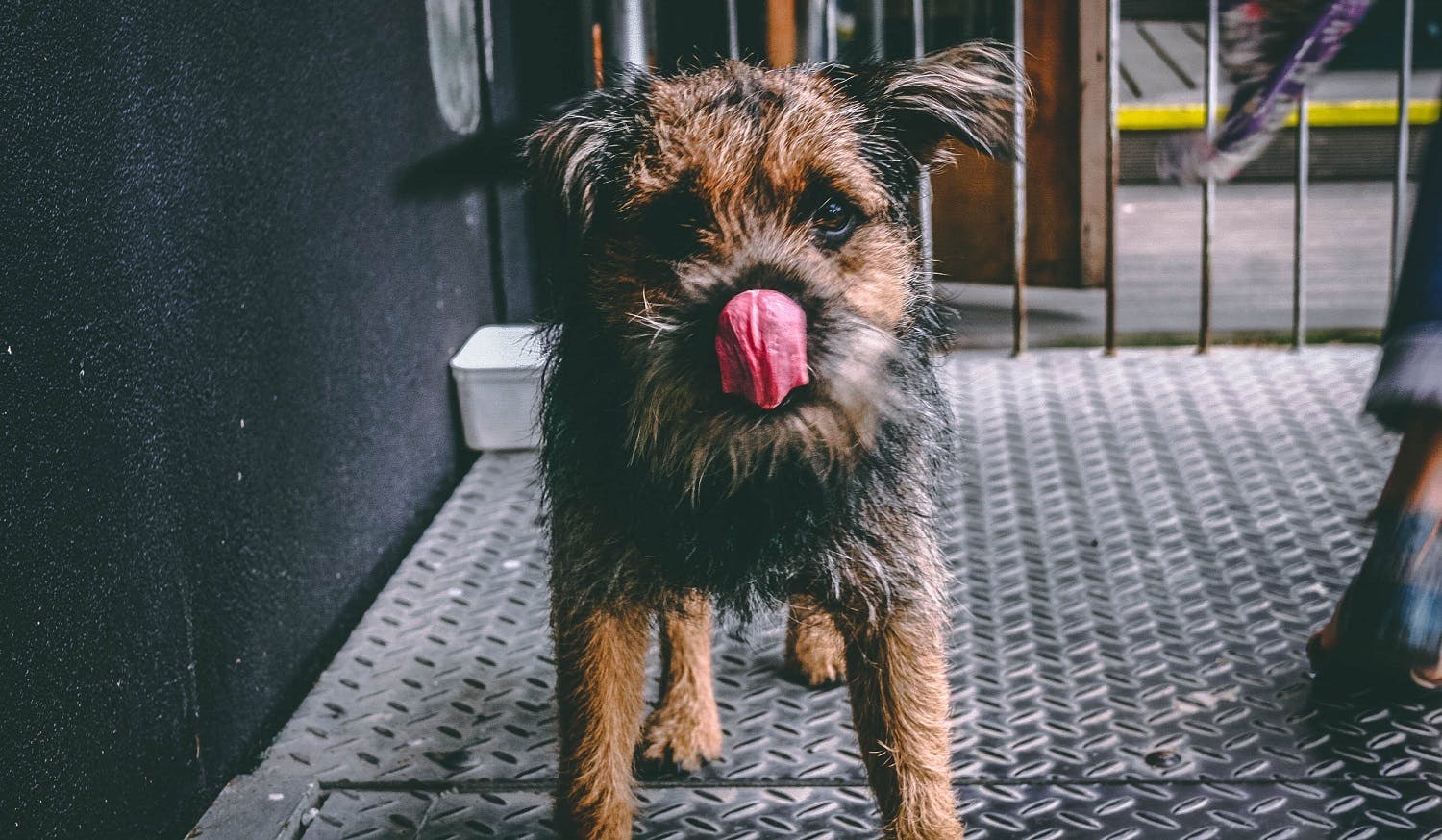Many dogs will chew on their paws on occasion. This is sometimes just an extension of routine cleaning, but it may also be a habit that develops with time. Chewing their paws, on the other hand, can be an indication of an underlying condition that needs medical care in some dogs.
Common Reasons Why Your Dog Might Be Chewing at Their Feet?
Infestation
There are numerous ways for dogs to become infected with parasites. Fleas, as eggs or adult fleas, are usually brought into the house by animals or pets that have fleas, but they can also leap through doors and windows and enter the house on a person's pant legs. Ticks are picked up while walking through the shrubs and long grass. Intestinal parasites are often spread when an animal consumes contaminated soil, water, or food containing the eggs or spores of the parasite. Puppies can catch a parasite from their moms while they are still in the womb or while nursing. Tapeworms can be transmitted to dogs by eating an infected flea. Heartworm is spread through mosquito bites.
Parasitic insects, such as fleas or mange, can lead our dogs to bite and chew incessantly. Bites from these parasites cause the skin to become red and irritated. Dogs with flea or mite infestations will frequently bite all four feet and will be red and itchy in other areas of their body. Itching can also be caused by ticks. If a tick becomes stuck on your dog's paw or between their toes, he or she may chew on it to relieve the itch and remove the bug.
These pests can be difficult to detect, so just because you don't see any parasites doesn't imply they don't exist.
Allergies
It is extremely typical for dogs to chew their paws in order to relieve itching. Consider it a canine version of scratching an itch (although dogs will sometimes do that with their paws as well). Allergies are a typical cause of discomfort and irritation, which leads to the desire to bite.
The most prevalent type of allergic reaction in dogs is skin allergies, often known as allergic dermatitis. Skin allergies in dogs are caused by three main factors: flea allergy dermatitis, food allergies, and environmental allergens
An allergic reaction to fleabites causes flea allergy dermatitis. Some dogs are allergic to flea saliva. This causes affected dogs to be exceedingly itchy, especially at the base of the tail, and their skin to become red, inflamed, and scabbed.
Itchy skin can also be caused by food allergies and sensitivities. Dogs with food allergies frequently scratch their ears and paws, which may be accompanied by gastrointestinal issues.
Atopic allergic reactions or atopic dermatitis can be triggered by environmental allergens such as dust, pollen, and mold. Most allergies are seasonal, so your dog may only itch at particular periods of the year. As with food allergies, the paws and ears are the most usually affected areas (but also include the wrists, ankles, muzzle, underarms, groin, around the eyes, and in between the toes).
Skin Issues
Skin disorders in dogs are one of the most frequent health conditions, and they can be caused by a range of factors. It is natural for your dog to itch now and then, but if you find it biting and scratching itself often, this could be a sign of an underlying skin problem.
Dogs' dry skin is caused by an allergic, parasite, or bacterial reaction to the environment, nutrition, or season, causing them to scratch, rub-up, bite, or lick excessively. Dry skin is characterized by flaky, red, or dandruff patches that can become itchy or sensitive to touch.
A yeast infection is one of the most frequent skin illnesses in dogs. Because yeast prefers warm regions to flourish, this sort of illness frequently occurs around the ears or paws. You may notice your dog pawing at his or her ears and chewing on his or her paws, as well as inflamed or discolored skin, if he or she has a yeast infection. Medicated baths, ointments, and oral drugs can all be used to treat yeast infections.
Impetigo and folliculitis are two more common skin illnesses in dogs that can cause lumps, blisters, and scabs. Blisters on the puppy's stomach are common with impetigo.
Pain
Whenever your dog is chewing on his paws, check to determine if he is hurt or injured. Because a dog's paws are continually in contact with the ground and floor, a thorn, small rock, sticker, glass shard, burr, or splinter can readily become embedded in his foot. He may have also cut his foot while running around outside.
If your dog is hurt, he will chew on his paws to ease pain or to remove a foreign object. Your dog may also have an orthopedic problem, such as arthritis or hip dysplasia, and his response may be to chew or lick the painful area.
Mental Health
Your dog may lick or chew its paws as a result of a behavioral or emotional issue. Among the issues are:
- Boredom: Are you stuck inside on a wet day or alone for hours? Pooches become bored quickly if they are not cognitively or physically stimulated, and they may chew things as a kind of stimulation.
- Anxiety: A variety of causes can cause anxiety in dogs, ranging from loud noises and separation from their owner to new situations and people. Dogs may chew on their paws and fur to either distract or calm themselves.
- Stress: Similar to nervousness, if your dog is agitated, he or she may lick or chew on their paws to relax themselves.

How To Help Your Dog
The only method to stop your dog from chewing his paws is to treat the underlying source of the problem. Here are a few basic steps you can do to help your dog from biting his paws:
Food substitutions
If your dog suffers from food allergies, eliminating potential trigger foods can make a significant difference. Many pet owners are surprised to learn that grains are a rare cause of food allergies - most pets are allergic to animal proteins! The addition of fatty acid supplements to your pet's normal meal can also aid in the treatment of dry skin and the maintenance of your dog's coat.
Give a chew toy to your dog
This is an excellent method of redirecting your dog's chewing. Rather than attempting to catch your pooch in the act of gnawing, distract it with a fascinating new toy. This is a simple approach to refocus your pup's chewing while still keeping it active and entertained—a win-win situation!
Purchase a pair of dog booties
These fashionable shoes will keep your dog from gnawing on its paws. Dog booties are normally worn in the winter or summer to protect a dog's paws from severe weather, but who says they can't be worn at any time? The booties provide a protective layer between your puppy's teeth and paws, reducing ripping at the skin and potential illnesses.
Maintaining Your Dog's Coat to Reduce Itching
Simply work on taking better care of the coat if it itches from a dry coat. When giving your dog a bath, consider adding a conditioner or switching to a moisturizing oatmeal shampoo.
If your dog is stressed or anxious, comfort it
Reducing triggers can help you break their chewing habit. Aside from chewing its paws, keep an eye out for excessive growling, whimpering, putting its tail between its legs, or pacing. Take note of what's going on around your pup when it exhibits this behavior and do your best to eliminate the source of fear. This will help your dog relax and quit chewing on its paws.
If your dog's paws are irritated, use paw balm
By reducing itch and irritation, you can prevent your dog from chewing on its paws. If your dog has an infection, swollen paw pads, or even a cut or scrape, it's most likely chewing to relieve the pain. Applying a soothing or medical balm on your pet's paws will help—just make sure the balm doesn't include any toxic ingredients in case they start gnawing again.

How To Prevent Your Dog From Chewing Foot
Some situations cannot be avoided, while others can. Flea and tick prevention medication should be given to dogs on a monthly basis. This will help to avoid flea allergies and inflamed skin. It is critical to keep your dog away from potentially harmful chemicals. If you apply insecticides on your yard, your dog should not be permitted to walk on it until the chemical has dried. The same is true for freshly cleaned floors or carpets. Toys, attention, and daily exercise should be offered for dogs. Additional activities can help a dog avoid becoming bored or agitated.
When to Go to a Vet for Help?
Dogs groom themselves by licking, chewing, and cleaning their paws. It's essentially their method of bathing themselves. However, it is critical to recognize when it has progressed beyond self-grooming and into the realm of medical intervention. Here are some warning indicators to check for:
- Continuous chewing or vigorous licking
- Excessive bleeding or wounds with large gaps
- Foreign items embedded
- Inflammation, pus, or stink
An appointment with a veterinarian should be made as soon as possible if any of these signs are noticed, or if the skin is bleeding due to excessive licking, gnawing, or from a wound.
Conclusion
When you notice your dog gnawing at its feet, it does not indicate that something is wrong with him. It could just mean that your dog is acting like any other happy dog. On occasion, your dog will bite at his feet in an attempt to communicate with you. Keep a watchful check on your dog at all times. Nobody knows your dog like you do. If you suspect that your dog is suffering from a serious condition when he chews his feet, take necessary action.
For more information, please feel free to contact us and talk to one of our Pet Experts and get customized advice by submitting a request through our Mavyn website
